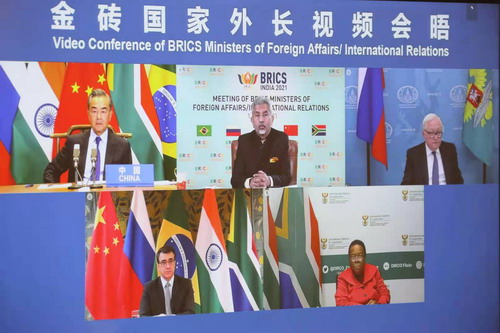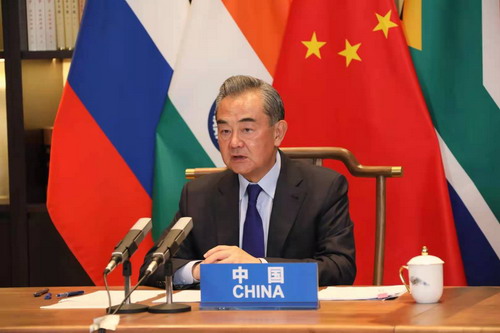
On June 1, 2021, State Councilor and Foreign Minister Wang Yi attended the Video Conference of BRICS Ministers of Foreign Affairs/International Relations in Guiyang. Chaired by External Affairs Minister Subrahmanyam Jaishankar of India, which assumes the BRICS Chairmanship in 2021, the conference was attended by South African Minister of International Relations and Cooperation Grace Naledi Mandisa Pandor, Brazilian Minister of Foreign Affairs Carlos Alberto Franco Franca, and Russian Foreign Minister Sergey Lavrov.
Noting that this year marks the 20th anniversary of putting forward the concept of BRICS countries and the 15th anniversary of the establishment of the BRICS ministers of foreign affairs/international relations meeting mechanism, Wang Yi said, our cooperation has seen an increasingly better mechanism and reached into increasingly wider fields, exerting increasingly stronger international influence. It has forged a three-pillar-driven framework in the areas of economy, trade and finance, political security and people-to-people exchanges, and created a model for cooperation between emerging markets and developing countries. In the face of major changes and ravaging COVID-19 pandemic both unseen in a century, BRICS countries should explore new opportunities and break new grounds amid crises and changes, jointly polish the "golden signboard" of BRICS, take on the BRICS responsibility for greater global solidarity, provide BRICS wisdom to address governance deficit, and contribute BRICS strength to tackle common challenges.
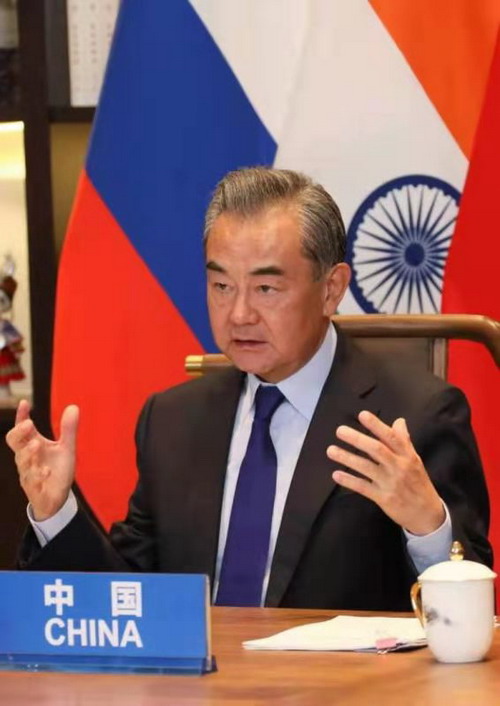
Wang Yi put forward four suggestions:
First, BRICS countries should promote global solidarity to fight the pandemic and be the guardians of people's health. The recent period has seen repeated resurgence and frequent mutations of the coronavirus, making us realize more deeply that the fight against the pandemic is a marathon, and countries cannot let up but step up cooperation. The ups of infections in the Southern Hemisphere but downs in the Northern Hemisphere are partly a result of vaccine hoarding and export control by a handful of developed countries. But BRICS members are trying their best to provide other countries with vaccines while vaccinating their citizens. China has provided more than 350 million doses of COVID-19 vaccines to the international community. This is in sharp contrast to the "domestic priority" approach. I hope that BRICS countries will continue to make vaccines a global public good, adhere to the principle of fair and reasonable distribution, and support the World Health Organization in accelerating the implementation of COVAX facility and in making an early decision on waiving intellectual property rights on COVID-19 vaccines. It is necessary to accelerate the construction of the BRICS vaccine research and development center, support domestic vaccine companies in transferring technology to other developing countries, carry out cooperative production, and provide new assistance for the global elimination of the "vaccine divide". China proposes to establish an international forum for vaccine cooperation, with the participation of BRICS countries and companies welcomed.
Second, BRICS countries should practice genuine multilateralism and be the defenders of the international order. Multilateralism acts as an important cornerstone of the current international system. At present, this cornerstone is being eroded. For example, "multilateralism giving domestic priority", "club-like multilateralism" and "selective multilateralism" are actually unilateral acts under the banner of multilateralism, and some even exercise hegemony in the name of multilateralism. The world needs true multilateralism to ensure that multilateral ideas are upheld, multilateral principles are safeguarded, and multilateral effectiveness can be manifested. As representatives of emerging markets and developing countries, BRICS countries should also be models of genuine multilateralism. We should procure all parties to follow the purposes and principles of the UN Charter, without seeking exceptionalism and double standards; to uphold the spirit of extensive consultation, joint contribution and shared benefits, without engaging in hegemony and bullying and zero-sum games; to pursue openness, inclusiveness and win-win cooperation, without conducting group politics and ideological confrontation; and to be action and problem-oriented, without indulging in high-flown or empty talks. The five BRICS countries should make concerted efforts to strengthen the UN-centered international system and maintain the international law-based international order.
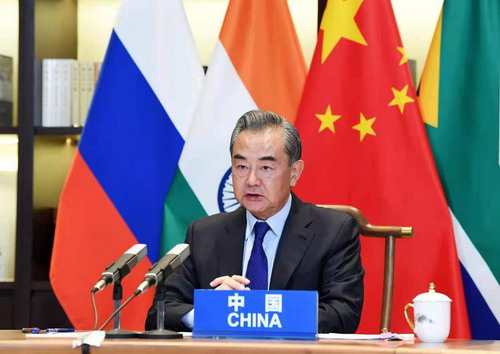
Third, BRICS countries should help with the recovery of the world economy and be the contributors to global development. In the time of COVID-19, the world economic recovery is unbalanced, the development gap between the North and the South is widening, and BRICS countries are also facing a more complex development environment. The five countries should strengthen macroeconomic policy coordination, implement the BRICS Strategy for Economic Partnership until 2025 effectively, work to enhance trade and investment liberalization and facilitation, and facilitate accelerated achievement of the 2030 Sustainable Development Goals. In view that digital economy and green economy define the future development, China supports the formulation of an action plan for BRICS cooperation in scientific and technological innovation with an aim to form new development momentum with technological innovation and digital transformation. China has established an innovation base for the BRICS partnership on new industrial revolution in the city of Xiamen, Fujian Province, and looks forward to the active participation of BRICS countries. BRICS countries should strengthen cooperation in green industry, green technology, and green financing to jointly realize the modernization of harmony between man and nature and build a community of life for man and nature. BRICS countries should actively expand the "BRICS+" cooperation model and strengthen the coordination of developing countries in solidarity. They should also inject additional political momentum into the membership expansion of the BRICS New Development Bank and make endeavors to attract the first group of new members into the bank at an early date within the year so as to increase the bank's influence and coverage and benefit more countries.
Fourth, BRICS countries should resolve regional conflicts and confrontation and build a peaceful world. Due to the ongoing COVID-19 impact on world peace and security, old hotspot issues are seeing new developments and new hotspot issues are exacerbating old conflicts. The situation has become more complicated when traditional hotspot issues are interwoven with non-traditional challenges. BRICS countries should implement a new vision of security featuring common, comprehensive, cooperative and sustainable security, move forward the resolution of international and regional hotspot issues such as Palestine-Israel conflict, Joint Comprehensive Plan of Action, Afghanistan issue, the disposal of Fukushima nuclear wastewater and terrorism, and resolve disagreements and carry out more preventive actions through dialogue and consultation. Flagrant external interference and regime change will not solve any problem, but bring greater issues or even crisis. We must learn from the past.
Wang Yi stressed that one month later, the Communist Party of China (CPC) will celebrate the 100th anniversary of its founding, which will be of great importance to China and the world at large. The CPC has always fulfilled its founding mission, that is to seek happiness for the Chinese people and rejuvenation for the Chinese nation. China is ready to work with the people of all countries to build a community with a shared future for mankind. He hopes that BRICS countries will work more closely with each other to uphold the values of peace, development, equity, justice, democracy and freedom shared by all humanity, uphold genuine multilateralism and make new contributions for international and regional peace and development.
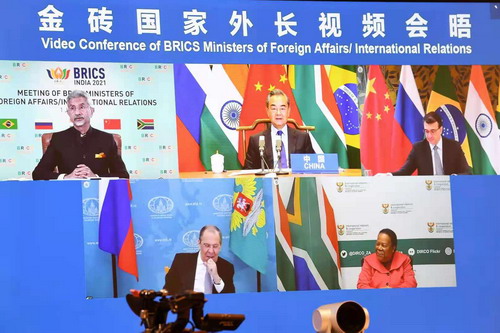
The participating foreign ministries exchanged in-depth views on the current international and regional hotspot issues and BRICS cooperation. They spoke highly of the fruitful results in the past 15 years since the beginning of the meeting of BRICS ministers of foreign affairs, and said they will support the cooperation in areas of common interests under the three-pillar-driven cooperation framework in the areas of political security, economy, trade and finance and people-to-people exchanges. They also expressed appreciation for India's efforts to host the event amid the pandemic as the BRICS Chairmanship in 2021.
When having in-depth discussions about the global pandemic control, the participating foreign ministries stressed the importance of bilateral and multilateral international cooperation on effective pandemic responses, and pointed out that the tendency of politicalizing the pandemic is eroding the foundation of multilateral systems. They called for all BRICS countries to enhance anti-pandemic cooperation, set up the BRICS Vaccine R&D Center, support the convening of BRICS vaccine cooperation symposium, and make greater contribution for the world public health and security.
The foreign ministers reiterated their firm commitment to multilateralism, and stressed the need to take the purposes and principles of the UN Charter as the indispensable cornerstone of the international law, and uphold the centrality of the United Nations in the international system. They stressed the need to give full play to the BRICS cooperation mechanism, and build a more fair, just, inclusive, equal, and more representative multi-polar international system.
The foreign ministers emphasized that the BRICS partnership is of great importance to post-pandemic economic recovery, and appreciated the important role of the BRICS New Development Bank in infrastructure construction and sustainable development. The information and communication technology has enormous potential in economic growth, and innovation is the key driver of global sustainable development. They welcomed China to establish an innovation center for the BRICS Partnership on New Industrial Revolution.
The foreign ministers expressed their concerns over the lasting conflicts and violence in various regions of the world and their impact on international and regional peace and security. They reiterated that all conflicts should be resolved by political and diplomatic means through dialogue and consultation based on the international law.
The BRICS Joint Statement on Strengthening and Reforming the Multilateral System and the Media Statement Meeting of the BRICS Ministers of Foreign Affairs were released at the meeting.
